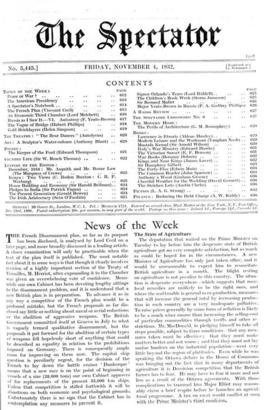The State of Agriculture - The deputation that waited on
the Prime Minister on Tuesday to lay before him the desperate state of British agriculture got no very complete satisfaction, but as much as could be hoped for in the circumstances. A new Minister of Agriculture has only just taken office, and it would be unreasonable to expect him to resuscitate British agriculture in a month. The blight. refting on agriculture is not peculiar to this country. The situa- tion is desperate everywhere--which suggests that mere local remedies are unlikely to be the right ones, and where the real trouble is general over-production, measures that will increase the general total by increasing produc- tion in each country are a very inadequate palliative. To raise prices generally by some form of reflation is likely • to be a much wiser course than increasing the selling-cost of particular commodities through tariffs- and other re- strictions. .Mr. MacDonald, in pledging himself to take all steps possible, subject to three conditions—that any mea- sures taken must be effective ; that they must make matters better and not worse ; and that they must not lay undue burdens on the industrial population—went very little beyond the region of platitudes. Even while he was speaking the Ottawa debate in the House of Commons was bringing out the fact that in many departments of agriculture it is Dominion competition that the British farmer has to fear. He may have to fear it more and not less as a result of the Ottawa agreements. With those complications to trammel him Major Elliot may reason- ably claim a brief respite before he launches an agricul- ;tura' programme. A tax on meat would conflict at once with the Prime Minister's third condi don.










































